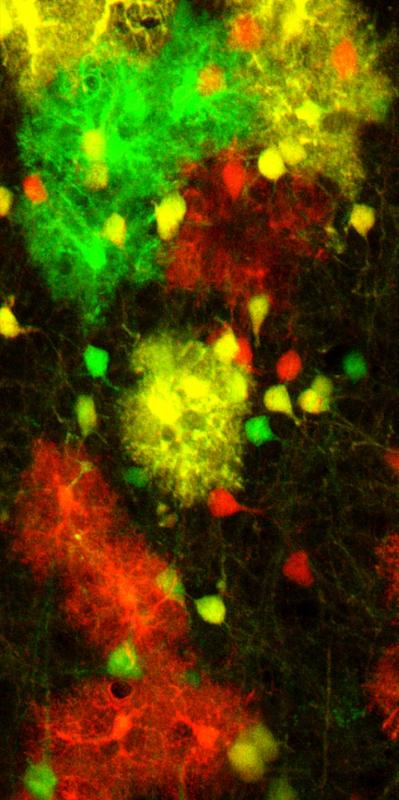Cells react differently to genomic imprinting

Astrocytes in the mouse brain, labelled using the MADM technique. Simon Hippenmeyer / IST Austria
Previous studies have shown that imprinted genes are more active in some tissues, and less active in others. The neuroscientists led by Hippenmeyer found that imprinted genes in the cortex are also more strongly expressed, i.e. are more active, in some cell types than in others.
Looking at the single cell
To investigate the effect of this varying gene activity, the researchers made use of the MADM technique established by Hippenmeyer. “This technique enables us to color-code cells and simultaneously raise or lower the gene expression level,” explains Susanne Laukoter.
“In our experiments, we doubled the expression of imprinted genes in some cells and switched their expression off completely in others. We were thus able to observe at the single-cell level how cells react to changes in the gene dose.”
The researchers found that cells respond to changes in the dose of imprinted genes by activating certain gene groups – in particular gene groups that are important for cell death, growth, and the development of synapses. This response was strongest in the cell type of astrocytes, a form of glia cells that support neurons.
A detailed analysis showed that astrocytes with a double dose of some paternal genes are always present in higher numbers than astrocytes with a double dose of the corresponding maternal genes.
This difference was present throughout the brain’s entire development. “Either genomic imprinting protects cells with a double paternal gene dose from cell death, or the double maternal gene dose accelerates cell death,” explains Florian Pauler.
Potential relevance for human syndromes
Earlier studies already suggested a link between genomic imprinting and cell death, the newly published study now shows that this link depends on the cell type and is particularly strong in astrocytes. Neurons with a double number of maternal genes did not respond with changes in cell death, but instead formed different connections and networks. Simon Hippenmeyer explains the result.
“Each cell type responds differently to disomy, i.e. the presence of two maternal or two paternal genes.” This might also be important for humans. “Prader-Willi syndrome and Angelman syndrome are caused by a duplication of an imprinted chromosomal segment. Each organ responds differently to the duplication. Hopefully, if we can better understand the cell type-specific response, a targeted therapy may be possible in the future.”
The study also resolves a long-standing debate in neurobiology concerning how many genes in the brain are subject to genomic imprinting, reports Hippenmeyer. “A few dozen genes in the cerebral cortex are imprinted and significantly affect development.”
Susanne Laukoter, Florian M. Pauler, Robert Beattie, Nicole Amberg, Andi H. Hansen, Carmen Streicher, Thomas Penz, Christoph Bock & Simon Hippenmeyer. Cell-Type Specificity of Genomic Imprinting in Cerebral Cortex. Neuron. DOI: 10.1016/j.neuron.2020.06.031
Media Contact
All latest news from the category: Life Sciences and Chemistry
Articles and reports from the Life Sciences and chemistry area deal with applied and basic research into modern biology, chemistry and human medicine.
Valuable information can be found on a range of life sciences fields including bacteriology, biochemistry, bionics, bioinformatics, biophysics, biotechnology, genetics, geobotany, human biology, marine biology, microbiology, molecular biology, cellular biology, zoology, bioinorganic chemistry, microchemistry and environmental chemistry.
Newest articles

Trotting robots reveal emergence of animal gait transitions
A four-legged robot trained with machine learning by EPFL researchers has learned to avoid falls by spontaneously switching between walking, trotting, and pronking – a milestone for roboticists as well…

Innovation promises to prevent power pole-top fires
Engineers in Australia have found a new way to make power-pole insulators resistant to fire and electrical sparking, promising to prevent dangerous pole-top fires and reduce blackouts. Pole-top fires pose…

Possible alternative to antibiotics produced by bacteria
Antibacterial substance from staphylococci discovered with new mechanism of action against natural competitors. Many bacteria produce substances to gain an advantage over competitors in their highly competitive natural environment. Researchers…





















